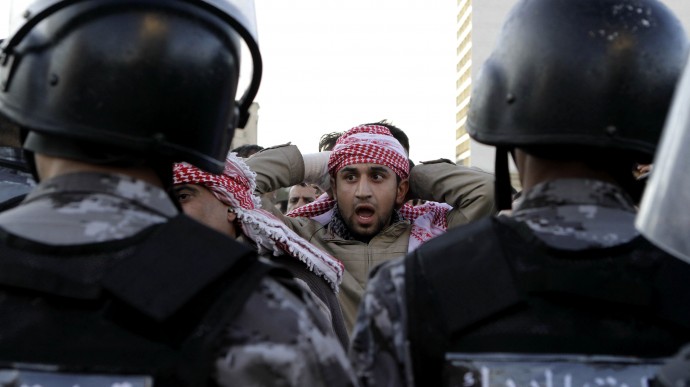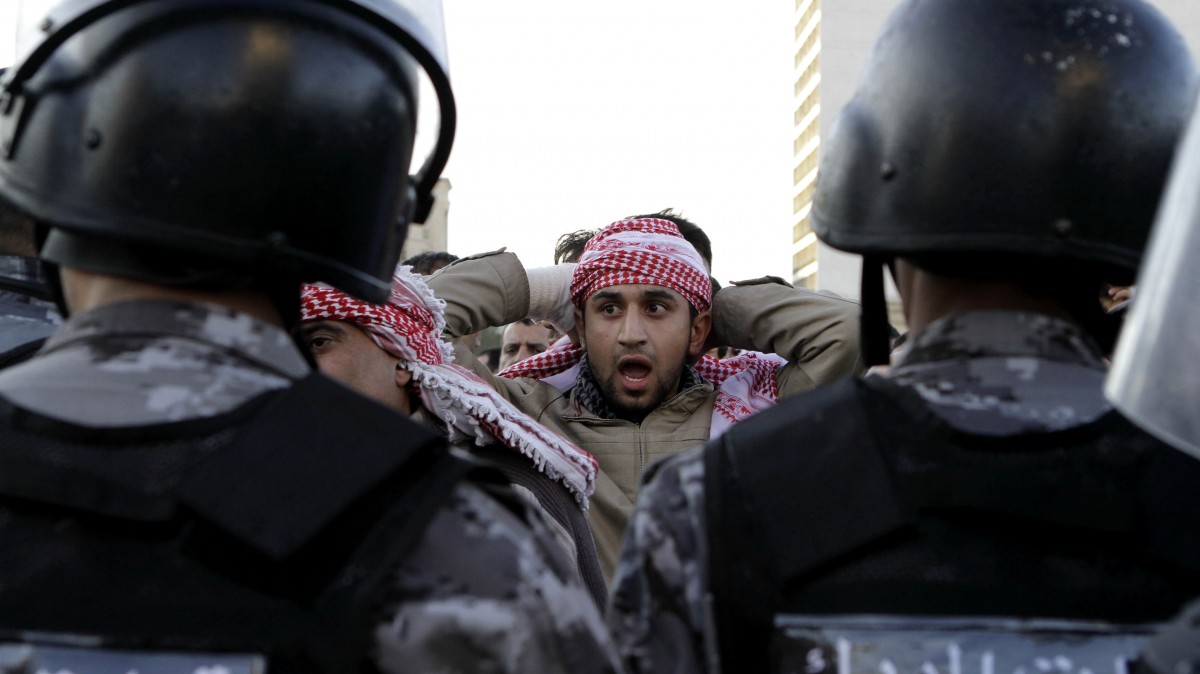
(MintPress) – Over 120 protesters were arrested in Jordan this week as tens of thousands continue to protest the 54 percent increase in cost for cooking gas across the Hashemite Kingdom. Jordan has largely been insulated from Arab Spring protests that have rocked other long time dictatorships. However, the recent uprising threatens to ignite an internal uprising that could unseat King Abdullah II in the future.
Since the fall of Ben Ali in Tunisia and Hosni Mubarak in Egypt, Arab Spring uprisings have continued in other countries with a much more combative, militaristic face. Countries throughout the Levant are now beset by violence, a result of a sustained push for greater citizen freedoms. Although the Israel-Palestine conflict is much older than the current Arab Spring clashes, the underlying push for national freedoms is the underpinning uniting these seemingly disparate movements.
The status quo of oppression and dictatorial rule has been widely rejected as more than 40,000 Syrians have given their lives to oust a tyrant in Bashar Assad. Unlike Syria, a country beset by sectarianism, Jordan — with a smaller, relatively homogenous population — could take a much quicker path toward democracy.
The decline of the Jordanian monarchy
An estimated 2,000 protesters took to the streets of Amman yesterday demanding the resignation of Prime Minister Abdullah Ensour after cuts to subsidies for kerosene, oil and cooking gas.
“Revolution, revolution, it is a popular revolution,” chanted the crowd as riot police violently confronted the protesters.
Already facing a quiet, growing opposition to his rule, King Abdullah’s consistent suppression of non-violent protest has undermined his legitimacy, threatening his long-term rule as king.
“I think it is too early to sing the death songs of the regime. However, the government is not representing the desires and aspirations of the people. Obviously with the Arab Spring, people are empowered to demand more,” said Ali Al-Ahmed in a recent MintPress statement.
Al-Ahmed, an scholar at the Institute for Gulf Affairs in Washington D.C., adds, “We will start seeing a push for a new type of government that is more representative and less corrupt.”
Jordan has been mostly insulated from the Arab Spring protests in surrounding countries largely because of strong U.S. support. In addition to Israel, Jordan is one of America’s closest allies in the region, receiving more than $682 million in aid in 2011.
Although the U.S. pays lip-service to democracy and human rights, dictatorships in Jordan and Arab Gulf states remain the closest regional allies of the U.S. insofar as they can help further U.S. interests in the region.
“The U.S. has been and continues to support dictators in the region. Jordan comes at the top of that list. The Gulf countries are also on the top of the list. The U.S. policy in the region is not driven by human rights or democracies. The top allies of the U.S. are dictatorships,” adds Al-Ahmed.
The very basis of the current crisis is driven by radical neoliberal economic policies that exacerbate income inequalities and create poverty. The International Monetary Fund (IMF) recently gave Jordan a bailout loan to help reduce the $5 billion national deficit.
As a result of the IMF-imposed austerity, the government has cut key subsidies. Oil and gas hikes have placed a tremendous strain on the developing country of 6 million, as most rely on gas for cooking, heating and other daily necessities.
The traditional of state bribery, known as “wasta,” normally employed to placate key bases of tribal support because many of those strongly opposed are East Bank Jordanians fed up with the current system.
Additionally, Jordanians have learned from the lessons of Tunisia, Egypt and other Arab states, challenging their government and imagining a new future for their country.
1989 strife renewed
The conditions are strikingly similar to a crisis in 1989 when King Hussein decided to accept a multi-billion dollar loan from the IMF. Faced with a crushing foreign debt, the king accepted the money and was compelled to institute structural adjustment reforms.
Mandated market liberalization, the calling card of the IMF, fomented chaos in the streets of Amman and other cities across the country. The resulting crisis brought thousands to the streets after cuts to wheat and other subsides prevented Jordanians from affording food for their families.
In order to placate widespread opposition, King Hussein bought the support of key tribesmen, historically the backbone of monarchical support. However, such a corrupt response is not possible in Jordan today.
“Buying off tribesmen no longer works anymore. The kids of tribesmen are more aware of the situation,” says Al-Ahmed.
Indeed, hysterical fears of a Palestinian takeover in Jordan previously allowed Abdullah and preceding kings to solidify their hegemonic rule. However, such a situation is not sustainable in the long term.
“Things are much more serious than 1989, because there are diverse elements getting involved. Even the traditional bases of support are demonstrating. Tribal Jordanians are participating in the demonstrations,” said Dr. Naseer Al-Omari, a member of the Jordanian opposition, in a recent MintPress statement.
Omari’s cousin, Qais Omari, was the killed by Jordanian police yesterday, the first fatality in the recent uprisings. Protests are expected to grow after Friday prayers.
Alomari remains optimistic that Friday could represent the turning point in the push for democracy saying, “Unlike Syria, a country with deep sectarianism, Jordan has a relatively homogenous society in terms of religious composition. Jordan has an educated elite, and could make the transition more easily than Syria.”
The Arab Spring continues, US intervention possible
In Syria, Jordan’s neighbor to the north, the most intense fighting of the ongoing Arab Spring could increase the appeal of a NATO intervention as a means to empower to rebel opposition, and topple the al-Assad dictatorship.
The broader Cold War divisions have been laid to bare as the U.S., Turkey, Saudi Arabia and Qatar stand firmly in support of a military intervention. Conversely, Russia and China have consistently blocked critical U.N. resolutions calling for al-Assad to step down.
The proxy war brokered through corrupt international bodies like the U.N. Security Council, will likely come at the cost of civilian lives.
Tunisia and Egypt, two states where a relatively peaceful transition of power has been heralded as successes, struggle to fully solidify their revolutions amidst battles with elements from the previous regimes.
At the same time, Israel has stepped up shelling of Gaza in an aggressive assault that is looking more like Operation Cast Lead, the 2008-2009 offensive that left 1,400 Palestinians dead and thousands more wounded.
Israel, seeking to deflect criticism of the illegal blockade of Gaza, has promoted the current operation as a means to thwart Hamas and Islamic Jihad from firing rockets into Israel. Fifteen Palestinians and three Israelis have been killed in the latest round of clashes.
The overriding concern for the U.S. is not one for human rights in Israel, Jordan, or Syria, but a desire to maintain easy access to petroleum markets. “2013 could be a very difficult year for the monarchy,” said Omari. “If king doesn’t make major changes, it could be the end of his regime.”


